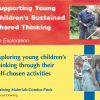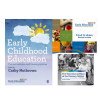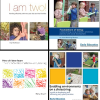Letter to the next Prime Minister
The letter below sets out our key asks for the next government.
The Early Career Framework has been designed by the Department for Education in England to support newly qualified teachers in England with a structured package of support in the following five areas: behaviour management, pedagogy, curriculum, assessment and professional behaviours.
To complement the framework, which may provide more generic support, this page suggests some reading and resources to support Early Career teachers in the early years by providing a specific focus on early childhood education and pedagogy. We welcome suggestions for other topics you would find useful and other resources that you recommend.
The early years has its own well-established and well-evidenced pedagogy, based on how very young children develop and learn. You may find the following texts and resources helpful:
The environment is a key part of early years pedagogy. Resources to support this include:
The role of the adult and adult-child interactions within the early years:
Diversity and inclusion
You will find areas of the early years curriculum covered in:
We encourage all those working in the early years to refer to the Early Education Code of Ethics or an equivalent document to guide professional behaviour and as principles to inform individual and collective decision making.
Being part of a community of like-minded professionals can give you a chance to exchange ideas and learn from others in your field – especially if you are working in environment where there are few early years specialists, such as within a primary school. Early Education offers opportunities to continue your professional learning and network through local branch events, national and regional events and online.
There are plenty of options for professional networking through social media and other early years membership organisations which we’d also encourage you to explore.
Use of research tools such as ECERS (more to follow)
Leadership in the early years (more to follow)
In the early years (and later stages) we often say that “all behaviour is communication”. Understanding young children’s development is at the heart of supporting children to learn to the cognitive and emotional self-regulation which supports pro-social behaviour.
For regular news and updates and access to all our resources, become a member (from £15 per year for NQTs).
The Early Career Framework has been designed by the Department for Education in England to support newly qualified teachers in England with a structured package of support in the following five areas: behaviour management, pedagogy, curriculum, assessment and professional behaviours.
To complement the framework, which may provide more generic support, this page suggests some reading and resources to support Early Career teachers in the early years by providing a specific focus on early childhood education and pedagogy. We welcome suggestions for other topics you would find useful and other resources that you recommend.
The early years has its own well-established and well-evidenced pedagogy, based on how very young children develop and learn. You may find the following texts and resources helpful:
The environment is a key part of early years pedagogy. Resources to support this include:
The role of the adult and adult-child interactions within the early years:
Diversity and inclusion
You will find areas of the early years curriculum covered in:
We encourage all those working in the early years to refer to the Early Education Code of Ethics or an equivalent document to guide professional behaviour and as principles to inform individual and collective decision making.
Being part of a community of like-minded professionals can give you a chance to exchange ideas and learn from others in your field – especially if you are working in environment where there are few early years specialists, such as within a primary school. Early Education offers opportunities to continue your professional learning and network through local branch events, national and regional events and online.
There are plenty of options for professional networking through social media and other early years membership organisations which we’d also encourage you to explore.
Use of research tools such as ECERS (more to follow)
Leadership in the early years (more to follow)
In the early years (and later stages) we often say that “all behaviour is communication”. Understanding young children’s development is at the heart of supporting children to learn to the cognitive and emotional self-regulation which supports pro-social behaviour.
For regular news and updates and access to all our resources, become a member (from £15 per year for NQTs).
The letter below sets out our key asks for the next government.
Early Education Associate, Debi Keyte-Hartland reflects on a recent commission by Balcarras Teaching School Hub In Gloucestershire to deliver a four-day course on Sustained Shared
Guest blog by Frances Giampapa and Claire Lee Introduction A wealth of evidence demonstrates the fundamental role played by early years (EY) education in shaping
by Katherine Gulliver Introduction Early Education was recently asked to review the special educational needs and/or disabilities (SEND) provision in the early years within one
Clare Devlin, Early Education Associate What aspects of physical development should we focus on within the Early Years Foundation Stage (EYFS) and other early years
By Debi Keyte-Hartland, Early Education Associate This article is based on one included in the Early Education Journal no 100. To access the full article
In this article, Kate Irvine from Bristol Early Years discusses the impact of practitioners engaging in a sustained process of CPD through cluster groups and
by Dr Jo Albin-Clark, Edge Hill University and Dr Nathan Archer, Leeds Beckett University Inspection in the news Being involved in education in England involves
What are “Fundamental British Values”? by Vicky Hutchin The so-called “Fundamental British Values” form a part of the Prevent Duty, introduced in 2015 and last
The open letter below was sent to Ofsted in November 2023. Download Ofsted’s response We the undersigned are writing to you about the recently published
Early childhood education today has been influenced by key figures such as Froebel, Montessori, Isaacs and MacMillan. Much recent research has supported their ideas although
Sustained shared thinking: An episode in which two or more individuals “work together” in an intellectual way to solve a problem, clarify a concept, evaluate
Early years pedagogy is the theory that informs the practice of teaching children in the early years. The pedagogical research has been carried out by
by Cathy Gunning What is reflective practice? Reading a book by Donald Schon early on in my career as a teacher opened my eyes to
The following extracts from past early years teaching newsletters have a feature which supports your team dialogue around pedagogy and practice dilemmas and reflective practice.
Last updated Spring 2018. The preschools of the Reggio Emilia in Northern Italy inspire us with their pedagogy and practice in giving children rich encounters
In most cases, sound early years principles and practices are already in place in settings. The EYPP funding allows settings to review and refine what
Who was Friedrich Froebel (1782-1852) Born on 21 April 1782 Friedrich Froebel was a German educator who invented the kindergarten. He believed that “play is
This article by Early Education Associate Anni McTavish explores the term “cultural capital”, and what it might mean for early years practitioners and their settings.
Welcome to the e-book Child-Centred Competences for Early Childhood Education and Care. The book brings together four years of research undertaken by early childhood academics
Raymond Williams maintained, after years of examining constructs of culture and society that “Culture is one of the two or three most complicated words in






Early Education
2 Victoria Square
St Albans
AL1 3TF
T: 01727 884925
E: office@early-education.org.uk